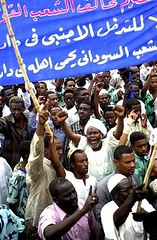
Sudanese demonstration against United Nations resolutions calling for intervention. The leading imperialist nations of the United Kingdom and the United States recently revealed plans to attack Sudan.
Originally uploaded by Pan-African News Wire Photo File
By Mohamed Hasni
AFP
Published May 30, 2007
Sudanese officials and analysts Wednesday dismissed new US sanctions over what Washington termed Khartoum's genocide in Darfur as being a largely political exercise rather than harsh economic curbs.
One official said that economic sanctions could hurt in the long term, but that his country was counting on its "friends" to avert this, notably China, which takes 60 percent of its oil exports.
"I am sure that the companies targeted [by Washington] have long put alternatives in place" to minimize this kind of sanction, said Mohammed Mahjub Harun, a member of Sudan's institute of strategic studies.
He and other analysts questioned saw the sanctions announced Tuesday by US President George W. Bush as a means of pressing Khartoum into accepting an international peacekeeping force for Sudan's western region of Darfur.
The United Nations says that 200,000 people have been killed there and 2 million made homeless since rebellion broke out four years ago. That drew a harsh crackdown by Sudan's army and its feared Arab Janjaweed militia allies, which has been blamed for widespread murder, rape, and burning of villages.
Sudan disputes those estimates, saying that 9,000 people have died.
"This is only a reinforcement of sanctions that have existed for 10 years and have not prevented the Sudanese economy from developing thanks to close links formed with Asia," said Harun.
The stricter sanctions will bar another 31 companies, including oil exporters, from US trade and financial dealings, and take aim at two top Sudanese government officials, the Treasury Department said.
Bush said that he had directed US Secretary of State Condoleezza Rice to seek a new UN resolution to broaden economic sanctions on Sudan's leaders, expand an arms embargo on Sudan, and bar Sudanese military flights over Darfur.
China, which is not only a major customer for Sudanese oil but also supplies arms to the country, opposed the latest sanctions.
Liu Guijin, Beijing's special representative on Darfur, said that the sanctions would "only make achieving a solution more complicated," but stopped short of saying that China would use its veto power to block a new UN resolution.
Hassen Mekki, a political science lecturer, pointed out that the latest sanctions exclude some Sudanese companies that trade with the United States, such as those which produce Arabic gum used in making the soda drinks manufactured by giant American companies.
Harun said that the impact of the sanctions in general could be gauged by the fact that "there has not been a single street demonstration."
But Ahmed Sharif Osman, another analyst, said that the sanctions would have an impact, albeit limited. "This impact will be measured in the volume of financial transactions going through the American system."
US officials say that the goal of the sanctions is to force Sudan to allow the full deployment of a UN peacekeeping force, disarm the Janjaweed militias blamed for much of the carnage, and let humanitarian aid reach the region.
In Khartoum, presidential advisor Mazjub Al Khalifa told reporters that the decision "highlights the hostile intentions and points to the fact that the United States does not want peace in Darfur."
Sudan's UN envoy Abdalmahmood Abdalhaleem Mohammad called Bush's moves "very regrettable" coming just when he said that Khartoum was cooperating with the United Nations on joint peacekeeping with the African Union in Darfur. The world body is seeking a combined force of some 20,000 peacekeepers.
Harun said that Washington was trying to push European countries into following its lead and could well succeed "because in all cases, the countries of Europe have few trade links with Sudan."
"But it is unlikely that China will do the same [as Washington]," he added.
No comments:
Post a Comment